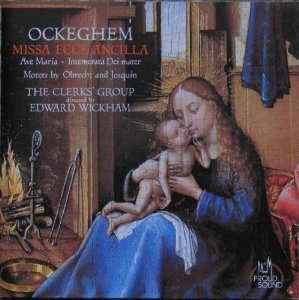Johannes OCKEGHEM. Missa Ecce ancilla Domini / The Clerks' Group
Johannes OCKEGHEM. Ave Maria · Intemerata Dei mater
Jacob OBRECHT. Salve Regina · JOSQUIN. Nymphes des bois

medieval.org
classicstoday.com
Proud Sound PROU CD 133
1993
AS&V "Gaudeamus" CD GAU 223
2001
Johannes OCKEGHEM
(c.1420-1497)
01. Intemerata Dei
Mater [7:03]
soprano RO, alto RB, tenor JG , 2 basses EW DW
02. Ave Maria
[2:51]
2 altos, 2 tenors, 2 basses DW ST
Missa Ecce ancilla
Domini
2 altos, 2 tenors, 3 basses
03. Kyrie [5:02]
04. Gloria [8:07]
05. Credo [10:46]
06. Sanctus [4:18]
07. Benedictus [3:27]
08. Agnus Dei [5:12]
Jacob OBRECHT
(1457/8-1505)
09. Salve Regina
for six voices [11:59]
3 sopranos, 2 tenors, bass ST
JOSQUIN
(c.1445/60-1521)
10. Déploration
sur la mort de Johannes Ockeghem [4:54]
Nymphes des bois
3 sopranos, 2 altos, 2 tenors, 3 basses
THE CLERKS' GROUP
Edward Wickham
Carys Lane, Rebecca Outram, Libby Crabtree - soprano
Fergus Mclusky, Robin Blaze - alto
Phaip Cave, James Gilchrist - tenor
Edward Wickham, Dominic Wallis, Simon Turnill - bass
Produced by Jonathan Freeman-Attwood
Engineered by Paul Proudman and ProudSound
Recorded at St Andrew’s, West Wratting, on 2nd and 3rd of
February, 1993.
"This recording combines one of Ockeghem's less well-known, middle
period masses with two of his motets as well as Obrecht's outstanding
six-part Salve Regina and the famously beautiful lament by Josquin on
the death of Ockeghem".

[from The Ockeghem Collection:]
Ockeghem may
have provided for his own commemoration with the five-voice motet Intemerata
Dei mater. Unusually for a composer of his generation, he
appears not to have based it on pre-existing music; having said which,
the beginning of the first and second sections allude to two of his
songs (respectively, Presque trainsi and Fors seulement,
the texts of which both declare a readiness for death), and through
these, two of his Masses based upon them (Mi-mi and Fors
seulement). With its kaleidoscopic treatment of vocal combinations,
its often bold and pungent treatment of dissonance, its dark scoring
and unerring formal sophistication, Intemerata is a magnificent
instance of Ockeghem's art.
© Fabrice Fitch
Whether you take an early Mass like Caput (1450s), a
middle-period one like Ecce ancilla Domini (c.1470), or
a late motet like Intemerata Dei mater (1480s), there is
always, behind the changing contrapuntal surface, a particular sound
quality that can only be described as Ockeghemian. Yet in the Missa
Ecce ancilla Domini the sounds and the rhythmic impetus change and
interact in such impressionistic ways as to defy any musical
expectation or prediction on the part of the listener. The Mass is less
varied in its handling of different procedures than some later works,
but this may be due partly to the changing of the stylistic seasons.
The Intemerata Dei shows that even the greater stylistic
variety typical of the 1480s and 1490s could be absorbed into the
composer's sound world.
© Rob. C. Wegman

